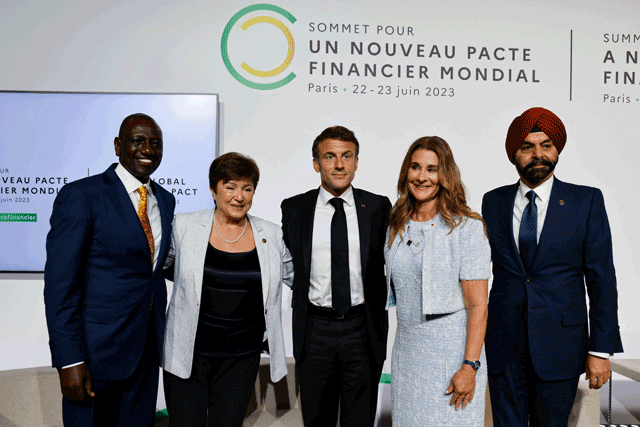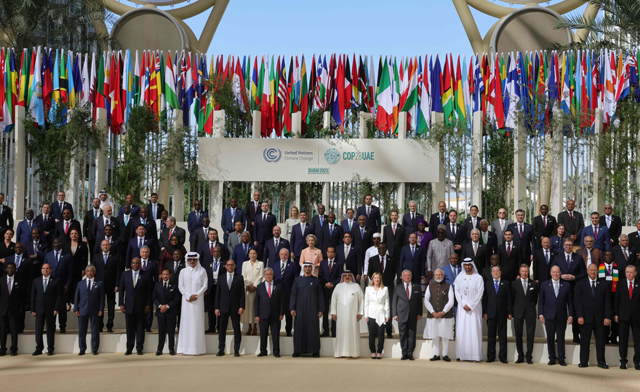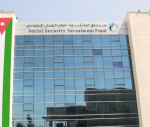You are here
Paris climate summit opens with call for 'finance shock'
By AFP - Jun 23,2023 - Last updated at Jun 23,2023

Kenyan President William Ruto, Managing Director of the International Monetary Fund (IMF) Kristalina Georgieva, French President Emmanuel Macron, US philanthropist Melinda French Gates and World Bank President Ajay Banga take part in a round table to discuss global economy with managing director of the IMF, Kristalina Georgieva and during the New Global Financial Pact Summit at the Palais Brongniart in Paris, on Thursday (AFP photo)
PARIS — The leaders of France and Barbados joined forces on Thursday to push for an overhaul of the international financial system at a summit aimed at tackling poverty and climate change.
French President Emmanuel Macron, who is hosting the two-day conference in Paris, invited Barbadian Prime Minister Mia Mottley to co-headline the event which seeks to improve the lending system for developing countries mired in poverty and threatened by planet-heating emissions.
In his opening remarks, Macron told delegates that the world needs a "public finance shock" — a global surge of financing — to fight these challenges, adding the current system was not well suited to address global challenges.
"Policymakers and countries shouldn't ever have to choose between reducing poverty and protecting the planet," Macron told the Summit for a New Global Financial Pact.
Ugandan climate campaigner Vanessa Nakate took the podium after Macron and asked the audience to take a minute of silence for people who are suffering from disasters.
With oil-rich Saudi Arabia's Crown Prince Mohammed Bin Salman in the crowd, she slammed the fossil fuel industry, saying they promise development for poor communities but the energy goes elsewhere and the profits "lie in the pockets of those who are already extremely rich".
"It seems there is plenty of money, so please do not tell us that we have to accept toxic air and barren fields and poisoned water so that we can have development," she said.
Economies have been battered by successive crises in recent years, including COVID-19, Russia's invasion of Ukraine, spiking inflation, debt, and the spiralling cost of weather disasters.
Mottley, whose Caribbean island nation is threatened by rising sea levels and tropical storms, has become a powerful advocate for reimagining the role of the World Bank and International Monetary Fund (IMF) in an era of climate crisis.
"What is required of us now is absolute transformation and not reform of our institutions," Mottley said.
Barbados has put forward a detailed plan for how to fix the global financial system to help developing countries invest in clean energy and boost resilience to climate impacts.
"We come to Paris to identify the common humanity that we share and the absolute moral imperative to save our planet and to make it livable," said Mottley.
Debt or healthcare
Outlining the challenges facing developing countries, UN Secretary-General Antonio Guterres said more than 50 nations were now in or near debt default, while many African countries are spending more on debt repayments than on healthcare.
Guterres said the post-World War II global financial system was failing to rise to modern challenges and now "perpetuates and even worsens inequalities".
"We can take steps right now and take a giant leap towards global justice," he said, adding that he has proposed stimulus of $500 billion a year for investments in sustainable development and climate action.
In a nod to those looking for tangible progress from the summit, IMF director Kristalina Georgieva announced that a key pledge to rechannel $100 billion of liquidity boosting "special drawing rights" into a climate and poverty fund had been met.
"Ultimately it is the future of humanity that is being discussed here," she told reporters.
Macron also said he was hopeful that a 2009 pledge to deliver $100 billion a year in climate finance to poorer nations by 2020 would finally be fulfilled this year — although actual confirmation the money has been delivered will take months if not years.
Big ideas
The summit comes amid growing recognition of the scale of the financial challenges ahead.
Last year, a UN expert group said developing and emerging economies excluding China would need to spend around $2.4 trillion a year on climate and development by 2030.
Countries are calling for multilateral development banks to help unlock climate investments and significantly increase lending, while stressing that new debt arrangements should include, as Barbados has, disaster clauses allowing a country to pause repayments for two years after an extreme weather event.
Other ideas on the table include taxation on fossil fuel profits and financial transactions to raise climate funds.
France backs the idea of an international tax on carbon emissions from shipping, with hopes of a breakthrough at a meeting of the International Maritime Organisation in July.
Observers are also keenly awaiting details of a plan from South American countries to create a global structure for so-called debt-for-nature swaps.
Kenyan President William Ruto said all these ideas should be explored and urged delegates not to see the challenges facing the world as divided between the global north and south.
"Climate change will consume all of us," he said.
Related Articles
VATICAN CITY — Pope Francis demanded swift action on Thursday to save the planet from environmental ruin, urging world leaders to hear "the
DUBAI — The United States led calls at UN climate talks on Saturday for efforts to curb methane emissions but also pushed a deeply controver
LE BOURGET, France — World leaders vowed Monday to save mankind from catastrophic climate change as an historic summit opened with the "hope
















